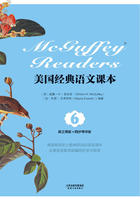
LESSON 14
VANITY OF LIFE
Johann Gottfried von Herder, 1744-1803, an eminent German poet, preacher, and philosopher, was born in Mohrungen, and died in Weimar. His published works comprise sixty volumes. This selection is from his “Hebrew Poetry.”
Man, born of woman,
Is of a few days,
And full of trouble;
He cometh forth as a flower, and is cut down;
He fleeth also as a shadow,
And continueth not.
Upon such dost thou open thine eye,
And bring me unto judgment with thee?
Among the impure is there none pure?
Not one.
Are his days so determined?
Hast thou numbered his months,
And set fast his bounds for him
Which he can never pass?
Turn then from him that he may rest,
And enjoy, as an hireling, his day.
The tree hath hope, if it be cut down,
It becometh green again,
And new shoots are put forth.
If even the root is old in the earth,
And its stock die in the ground,
From vapor of water it will bud,
And bring forth boughs as a young plant.
But man dieth, and his power is gone;
He is taken away, and where is he?
Till the waters waste from the sea,
Till the river faileth and is dry land,
Man lieth low, and riseth not again.
Till the heavens are old, he shall not awake,
Nor be aroused from his sleep.
Oh, that thou wouldest conceal me
In the realm of departed souls!
Hide me in secret, till thy wrath be past;
Appoint me then a new term,
And remember me again.
But alas! if a man die
Shall he live again?
So long, then, as my toil endureth,
Will I wait till a change come to me.
Thou wilt call me, and I shall answer;
Thou wilt pity the work of thy hands.
Though now thou numberest my steps,
Thou shalt then not watch for my sin.
My transgression will be sealed in a bag,
Thou wilt bind up and remove my iniquity.
Yet alas! the mountain falleth and is swallowed up,
The rock is removed out of its place,
The waters hollow out the stones,
The floods overflow the dust of the earth,
And thus, thou destroyest the hope of man.
Thou contendest with him, till he faileth,
Th ou changest his countenance, and sendeth him away.
Though his sons become great and happy,
Yet he knoweth it not;
If they come to shame and dishonor,
He perceiveth it not.
 STUDY GUIDE
STUDY GUIDE
A. Vocabulary in Context—Answer the following questions about vocabulary words in the poem.
1. This poem is called “Vanity of Life”. Vanity means no hope or futility. Why does the poem have this title?
2. Boughs are the branches of a tree. According to the poem, how are plants and men different after they are “cut down”?
3. To be aroused is to wake up after sleeping. What doers the poem say about man being aroused after death?
4. Dishonour means doing bad things. What does the poem say about dishonour?
5. In the sixth stanza of the poem, it says “Appoint me a new term”. This means to give someone more time to complete a job. This expression is often used in politics. What does this line mean in this poem?
B. Find the word—Using the clues, fill in the correct words from the poem.
1. stanza 1—problems: ___________________________
2. stanza 4—the part of a plant below the ground: _____________________
3. stanza 7—hide: _______________________________
4. stanza 8—breaking the rules: _____________________
5. stanza 9—not solid: ____________________________
6. stanza 10—feelings of guilt or foolishness: ________________________
C. What do you think? Give your opinion about the following questions that relate to the poem.
1. Do you agree with the poet that after we die, we don't live again?
2. If you could live again, would you like to be a human again, or a kind of animal? Why?
3. The poem says “The tree hath hope, if it be cut down”. Do people also have hope? Why or why not?
4. What do people need to do in order to be happy? Why do you think so?
5. Vanity is a negative word refering to life. What are some positive words refering to life? (for example—hope).